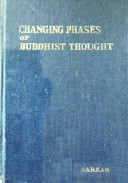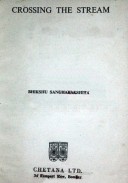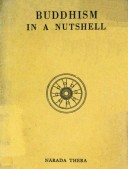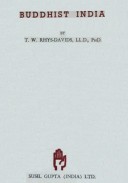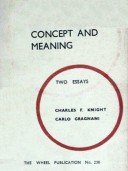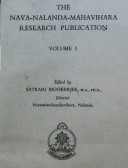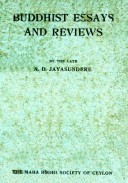Tìm Sách
Sách tiếng Anh-English >> Changing Phases of Buddhist Thought
Thông tin tra cứu
- Tên sách : Changing Phases of Buddhist Thought
- Tác giả : Anil Kumar Sarkar
- Dịch giả :
- Ngôn ngữ : Anh
- Số trang : 147
- Nhà xuất bản : Bharati Bhawan
- Năm xuất bản : 1967
- Phân loại : Sách tiếng Anh-English
- MCB : 1210000004798
- OPAC :
- Tóm tắt :
CONTENTS
PREFACE……………….vii
INTRODUCTION……………….xi
SOME SUGGESTED READINGS……………….xix
Chapter I Four Buddhist Schools……………….1
Chapter II Aivaghosa’s Reality (Tathatâ) and The Buddhist Thought in General……17
Chapter III Nagarjuna : On Causality and Nirvana……………….31
Chapter IV Nagarjuna and .Whitehead……………….47
Chapter V Dignaga’s Interpretation of the Perceptual Universe………59
Chapter VI Existentialism and its Affinity With Some Aspects of Buddhist Thought…88
Chapter VII Was Buddhism Expelled from India……………….116
INDEX……………….139
PREFACE
This book is mainly concerned with the clarification of the transcendent yet empirical thought-process of the four principal Buddhist schools which flourished in India in the dawn of the Christian era. It also refers to some eminent Buddhist thinkers who either generally influence the deliberations of the different schools or directly modify their tenets to prepare a ground for a further development of Indian thought. Asvaghosa (Ch. II), an independent Buddhist thinker of the first century A.D., influenced the development of two later schools of Buddhism, while Nãgãrjuna (Chs. III and IV), a revolutionary thinker of the second century A.D., reshaped the thoughts of the first two schools. Again, both Asvaghosa and Nãgãrjuna influenced the thoughts of the later emergent Buddhist schools, and indirectly, the Vedãntic thought of India in general. Dignãga (Ch. V), in the fifth century A.D., who was influenced by the four Buddhist schools in general, was responsible for what was known as the Logical School of Buddhism. It remained for Candrakĩrti (Ch. III), a commentator and follower of Nagarjuna, in the seventh century A.D., to confirm Nãgãrjuna’s standpoint by a criticism of Dignãga and some of his followers, and interpret Buddhism from a new perspective. Candrakĩrti revived an aspect of Buddhist thought which facilitated the process for organising the complex Vedãntic current of India flowing upon this glorious period of the Buddhist schools. The Buddhist current in its fusion with the emergent Vedãntic current in India, and in its multifarious Mahãyãnist forms in different Asian countries, is not an extinct philosophy of the past. It is a living force today, and claims to occupy a challenging position along with such progressive currents of the Western culture as fostered by the phenomenological deliberation of Husserl or the advanced existentialist reflections of Sartre. Through the ideas of the four Buddhist schools and some Buddhist thinkers, this book provides a ground for a development of intercultural process in a new aspect for which one has to develop a sensibility and interest.
The writer finally wants to mention that the major portions of this book, have already been published in some journals or special volumes, but they have been remodelled considerably to suit the requirements of the present work. A care has however been taken to preserve the individuality of the published papers. In this attempt some repetitions could not be avoided, but the writer feels that in difficult philosophical deliberations, such repetitions often facilitate understanding.
The writer has taken full responsibility for the development of ideas of this volume; but, for the general order and the style of expression, he has greatly depended on the suggestions and criticisms of his wife. Without her help, the writer frankly admits, the book would not have taken this present shape.
Prof. Archie J. Bahm of the University of New Mexico, Albuquerque, has gone through this entire work, and has given many valuable suggestions for which no word of thanks is adequate. The author is no less indebted to Mrs. Zeyen of the California State College at Hayward for her great interest shown in typing the manuscript with accuracy.
Hayward, California, U. S. A. ANIL K. SARKAR
May 20, 1967
 Facebook
Facebook
 Google
Google
 Google+
Google+
